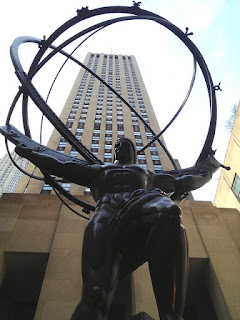This post contains affiliate links - using affiliate links from Homeschool Coffee Break helps fuel this blog and our homeschool - thank you!
I was having trouble deciding what to write about for the letter L, and finally settled on taking a few rabbit trails starting from the title of an iconic photograph. You may not recognize the title that it's sometimes known by, "Lunch Atop a Skyscraper", but I'm sure you would recognize the image of eleven men sitting on a beam high above New York City on their lunch break. The photo itself is still under copyright, but you can go to this link to see it: Lunch Atop a Skyscraper; or I can show you this art print:
 |
| art print of Lunch Atop a Skyscraper, photograph by Charles C. Ebbets |
Whoever took it, and whatever its title, the photo showing a group of construction workers having lunch on a crossbeam sparked interest in the lives of the men who built the skyscrapers of America. These men were workers on the RCA building in New York City. Many of the workers were immigrants struggling to support their families during the Great Depression. Because jobs were hard to find, and money was hard to stretch, many young men were not able to further their education. Many banks and businesses closed, and at the same time a widespread drought affected large swaths of the American Plains and Canadian Prairies. It was so dry that dust storms could last for days. and even blow the prairie dust all the way to east coast cities! Thanks to the drought, there were crop failures and many families had much less to eat than before the Depression, or at least much less variety. Practically everyone learned to practice economy during those years, from folks who stretched every penny and every bit of food to those who were still managing well, but learned to do more with less and not to waste anything.
So to go down another rabbit trail, isn't it interesting that construction of major skyscrapers continued in the 1930s? The RCA Building, or Rockefeller Center, that these men were working on, was built in the worst years of the Depression. John D. Rockefeller conceived the project as a "city within a city" and wanted it to be a hub of art, style, and entertainment. Its construction gainfully employed over 40,000 people. Mr. Rockefeller originally leased the land and planned to partner with the Metropolitan Opera to build an opera house on the site. After the stock market crash of 1929, the Met dragged its feet on the project, so Rockefeller continued without them, as sole financier. It was the largest private building venture of modern times. The design was updated and included 14 buildings, comprising over 8,000,000 square feet on 22 acres in Midtown Manhattan. Addresses in Rockefeller Plaza include the original Time-Life Building, the home of Today Show studios, the Associated Press Building, Radio City Music Hall, and of course, the RCA Building, now known as "30 Rock" and the headquarters of NBC.
 |
| Rockefeller Center |
 |
| Rockefeller Center at night |
 |
| at the Top of the Rock in 2015 |
 |
| Top of the Rock view of the Empire State Building |
"30 Rock" and the other original buildings were designed in Art Deco style which was very popular in the 1920s and 1930s. Art Deco style features bold colors and curves, geometric shapes and strong vertical lines. The Golden Gate Bridge, the Queen Mary ocean liner, and many American train stations, hotels, and diners built during the 1930s are in Art Deco style. The Empire State Building is also in Art Deco style.
Rockefeller Center is also significant because it was one of the last major building projects in the US to incorporate integrated public art. Rockefeller's vision was to create a center for art and style, so the complex includes many large-scale statues, sculptures, and friezes, and art deco motifs. Many celebrate man's development in science and industry. Rockefeller Center continues to host major artwork displays that are open to the public. (If you'd like to see all the Rockefeller Center artwork, you can view photos at the website: The Art of the Rockefeller Center - If you're viewing with young children, be aware that many of the statues and sculptures are nude figures, though stylized, and you may want to pick and choose which ones to share with your littles.)
 |
| Prometheus, Paul Manship |
 |
| Statue of Atlas, Lee Lawrie |
When we visited NYC in 2015 and went to the Top of the Rock, there was an area where you could pose on a crossbeam in imitation of the iconic photograph with a background of NYC on the wall behind you. We weren't touristy enough to purchase the photo of ourselves, but I do remember it. The Top of the Rock is an observation deck, built to resemble an ocean liner's deck, and is on the 67th, 69th, and 70th floors of the building. Being whisked up through 50 floors in a high-speed elevator made me appreciate the hard work of the construction laborers that built these skyscrapers, especially before the days of the regulation of the Occupational Health and Safety Association! They climbed and stood on girders, climbed wires, and rode on beams carried by cranes - often without safety equipment! This Deconstructing History video of the Empire State Building gives a great overview of the construction of the skyscrapers of this era.
Want to build your own paper model of the Empire State Building? Visit Paper Toys to print out the pieces.
There's an Everyday Easels lesson plan based on the photo at SchoolhouseTeachers.com.

 |
| The Empire State Building |
There's an Everyday Easels lesson plan based on the photo at SchoolhouseTeachers.com.

This post is linked at Blogging Through the Alphabet hosted by A Net In Time and Hopkins Homeschool. Join in to see what others are sharing related to this week's letter!
©2006-2017 Homeschool Coffee Break. All rights reserved. All text, photographs, artwork, and other content may not be reproduced or transmitted in any form without the written consent of the author. http://kympossibleblog.blogspot.com/













































2 comments:
now that was interesting reading. THANKS for the education. :)
Neat. I have never really paid attention to the picture of the men, though I know I have seen it. Fun rabbit trail! - Lori
Post a Comment
I love comments! It's like visiting over a virtual cup of coffee.